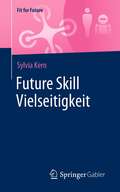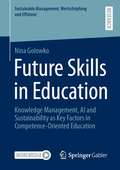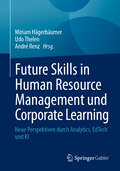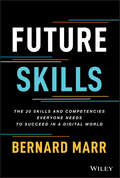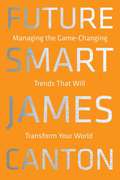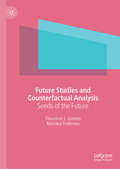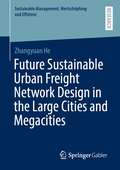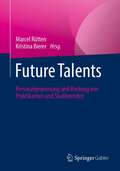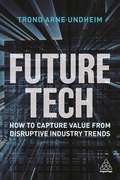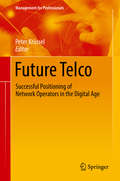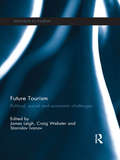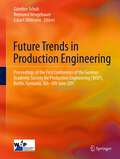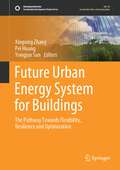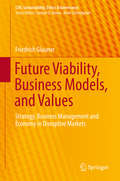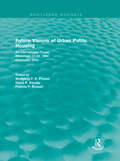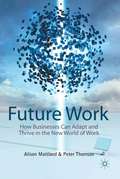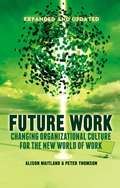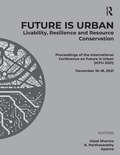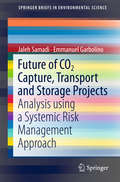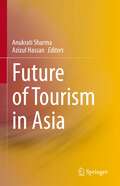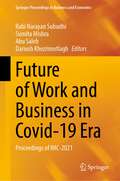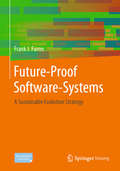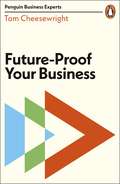- Table View
- List View
Future Skill Vielseitigkeit (Fit for Future)
by Sylvia KernUm in der VUCA Welt auch künftig erfolgreich zu sein, sind neue Fähigkeiten erforderlich. Alte Handlungsweisen und Expertisen zeigen keinen Effekt mehr und sind für die Welt, in der wir heute leben, nicht mehr angemessen. Wir benötigen in allem eine flexible Herangehensweise. Die Umstände werden immer unvorhersehbarer, was heute "in" ist, ist morgen schon wieder "out". Um in dieser unsicheren Umgebung erfolgreich agieren zu können, müssen wir in der Lage sein, uns flexibel an Situationen anzupassen. Diese Anpassungsfähigkeit schließt ein stetiges Erlernen und Dazulernen mit ein. Viele dieser Fähigkeiten sind in bestimmten Persönlichkeiten vereint, in sogenannten Scannern, Multipassionates oder Neo-Generalisten. Sie zeichnen sich beispielsweise durch ein Growth-Mindset und vielfältige Interessen aus. Dieses Buch hilft Ihnen Ihr Business auf Erfolgskurs zu bringen und Ihr Unternehmen fit für die Zukunft zu machen, indem Sie auf Agile Influencer setzen und so Ihr Erfolgsteam für die Zukunft aufbauen. Investieren Sie in Vielseitigkeit und Vielbegabung und Sie werden mit Innovationen und Lösungen belohnt!
Future Skills in Education: Knowledge Management, AI and Sustainability as Key Factors in Competence-Oriented Education (Sustainable Management, Wertschöpfung und Effizienz)
by Nina GolowkoThis book identifies central key factors for future-oriented teaching in Higher Education to support the task of ensuring the knowledge transfer for sustainable and competence-oriented employability to the future workforce. Through an innovative approach using machine-learning algorithms that employ the universities’ own and extern databases as knowledge base, new perspectives for the development of competence-oriented curricula and study programmes in Higher Education are shown.
Future Skills in Human Resource Management und Corporate Learning: Neue Perspektiven durch Analytics, EdTech und KI
by Miriam Hägerbäumer André Renz Udo ThelenDas Herausgeberwerk zeigt, wie Human Resource Management (HRM) und Corporate Learning (CL) zukunftsfähig gestaltet werden können und welche Future Skills zentral sind, um die anstehenden Herausforderungen in Unternehmen erfolgreich zu meistern. Ausgehend von den Megatrends und ihren Auswirkungen auf HRM und CL, veranschaulichen die Beiträge, wie Unternehmen Trendentwicklungen nutzen können, um innovative und nachhaltige Kompetenzentwicklungsstrategien zu entwerfen. Dabei rückt insbesondere die Rolle von Analytics, EdTech und KI in den Fokus: Wie beeinflussen diese Technologien HRM und CL und welche neuen Kompetenzen sind erforderlich? Die Expert:innen aus Wissenschaft und Praxis diskutieren, wie Unternehmen und ihre HR-Abteilungen durch die systematische Integration von Zukunftstechnologien und Future Skills nachhaltig erfolgreich aufgestellt werden können. Neben der theoretischen Fundierung werden praxisorientierte Ansätze und empirische Befunde präsentiert, die aufzeigen, wie HRM-Prozesse durch den Einsatz von Analytics und KI optimiert und wie Lernumgebungen mithilfe von EdTech transformiert werden können. Zahlreiche praktische Beispiele liefern Impulse und dienen Personalverantwortlichen als Inspiration.
Future Skills: The 20 Skills and Competencies Everyone Needs to Succeed in a Digital World
by Bernard MarrThe Brand NEW Book from Bernard Marr, bestselling author behind Business Trends in Practice - Winner of Business Book of the Year 2022. Future-proof yourself and develop critical skills for the digital future The working world has changed dramatically in the last twenty years and it&’s going to continue to transform at an even faster pace. How can the average professional stay afloat in an ocean of constant change and technological revolution? In Future Skills: The 20 Skills and Competencies Everyone Needs to Succeed in a Digital World bestselling author and futurist Bernard Marr delivers an engaging and insightful discussion of how you can prepare yourself for the digital future of work. You&’ll learn which skills will be in the highest demand, why they&’ll command a premium price, and how to develop them. You&’ll also find: Strategies for improving human-centered skills, like teamwork and collaboration Straightforward explanations of digital skills, like data literacy and cyber-threat awareness Ways to make yourself an indispensable component of future firms, and practical tips for continuous improvement A can&’t-miss book for every working professional seeking not just to survive – but to thrive – in the coming years, Future Skills belongs in the libraries of company leaders, managers, human resources professionals, educators, and anyone else with an interest in the future of work and how humanity fits within it.
Future Smart: Managing the Game-Changing Trends that Will Transform Your World
by James CantonGame-changing trends are coming in business, technology, workforce, economy, security, and environment. Climate change, energy demand, and population growth will redefine global risk and power. Exponential new technologies will emerge in digital money, mobile commerce, and big data. An explosive new middle class of over one billion consumers will enter the marketplace. Every nation, job, business, and person will be transformed. To thrive in this future you have to become predictive, adaptive, and agile--to become Future Smart. Dr. James Canton, a renowned global futurist and visionary business advisor, illuminates the pivotal forces and global power shifts that everyone must understand today to thrive in a rapidly changing landscape: Regenerative medicine will extend our lifetimes and rebuild our bodies Robots and drones will drive our cars, teach our kids, and fight our wars Smart machines will design, manage, and service 40% of all global businesses--energy, commerce, finance, and manufacturing--without humans Digital consumers who live always connected will challenge every business to change its strategy Climate change wars will redefine security and resources Most of us are not prepared to meet the challenges the future will bring, but these changes are coming fast. Armed with knowledge, those who are Future Smart can take action to reinvent themselves, their businesses, and their world.
Future Studies and Counterfactual Analysis: Seeds of the Future
by Theodore J. Gordon Mariana TodorovaIn this volume, the authors contribute to futures research by placing the counterfactual question in the future tense. They explore the possible outcomes of future, and consider how future decisions are turning points that may produce different global outcomes. This book focuses on a dozen or so intractable issues that span politics, religion, and technology, each addressed in individual chapters. Until now, most scenarios written by futurists have been built on cause and effect narratives or depended on numerical models derived from historical relationships. In contrast, many of the scenarios written for this book are point descriptions of future discontinuities, a form allows more thought-provoking presentations. Ultimately, this book demonstrates that counterfactual thinking and point scenarios of discontinuities are new, groundbreaking tools for futurists.
Future Sustainable Urban Freight Network Design in the Large Cities and Megacities (Sustainable Management, Wertschöpfung und Effizienz)
by Zhangyuan HeThis book aims to investigate a long-term strategy for sustainable urban logistics. The literature evidence exhibits that considerable research on urban logistics lacks long-term planning and rarely considers the urban spatial development and integration of urban distribution innovations. Currently, 11 distribution innovations can be used for future sustainable urban freight transport. According to a systematic discussion, this book formulates the conceptual model of Sustainable Inner-urban Intermodal Transportation (SIUIT) for future urban logistics. Moreover, a comprehensive analysis illustrates that future integrations of distribution innovations comprise operational and technological integration. To this end, the morphological analysis method is employed to discuss their feasible solutions based on the SIUIT model. After that, combined with the trend exploration of urban spatial development on large- and megacities, this book constructs the 2.x Modula & Sustainable Urban Freight Network to improve the flexibility of the future sustainable logistics transformation.About the AuthorDr. rer. pol. Zhangyuan He graduated from the University of Bremen. He currently undertakes postdoctoral research at the School of Urban Planning and Design, Peking University.
Future Talents: Personalgewinnung und Bindung von Praktikanten und Studierenden
by Marcel Rütten Kristina BiererPraktika bieten für Unternehmen eine gute Möglichkeit, um Nachwuchskräfte zu generieren. Sie tun sich allerdings nach wie vor schwer, die Bindung systematisch zu betreiben und das langfristige Potenzial, das sich durch Praktikantenprogramme ergibt, abzurufen. In Anbetracht eines zunehmenden Fachkräftemangels gewinnen Praktika deutlich mehr Bedeutung als strategischer und nachhaltiger Kanal in der Rekrutierung. Wer von langfristigen Effekten profitieren will, sollte sich bei der Talentgewinnung bereits frühzeitig dem gesamten Zyklus eines Praktikums und seiner Einflussfaktoren widmen. Dieses Herausgeberwerk liefert einen umfassenden Überblick zu akademischen Praktika in Deutschland und bringt durch die zahlreichen Beiträge der Autoren aktuelles Wissen, Best Practices und spannende, erfolgsversprechende Anregungen für die unternehmerische Praxis.
Future Tech: How to Capture Value from Disruptive Industry Trends
by Trond Arne UndheimAmazon's Fire phone. Google Glass. Facebook Home. Quikster. New technologies alone don't always cause industry changes. Future Tech explains how the four forces of technology, policy, business models and social dynamics work together to create industry disruption and how this understanding can help to predict what is coming next. Technology is generally viewed as the single force that disrupts markets. However, history is rife with stories of technologies that have failed to meet such hyped expectations. In Future Tech, the author reveals that true change only results from combining the forces of science and technology, policy and regulation, new business models (i.e. sharing economy) and social dynamics (whether or not people adopt it). Whether these four forces align explains why some technologies, such as AI, blockchain, robotics, synthetic biology and 3D printing, stick and why others fail. With an understanding of these four forces, business executives and policymakers can explain what technology is likely to stick and even anticipate what is coming next.By 2030, the global labor force will be led by an elite set of knowledge workers enabled by robotic AI. To help individuals thrive in this workplace, Future Tech advises readers to develop their human capabilities of creativity and adaptation, develop deep expertise in one domain while being well-versed in dozens more, and develop a personalized approach to acquiring and processing information and deliberating decisions.
Future Telco: Successful Positioning of Network Operators in the Digital Age (Management for Professionals)
by Peter KrüsselThis book examines the extensive changes in markets, technologies and value chains that telecommunication companies are currently confronted with. It analyzes the crossroads they have reached and the choices that now need to be made – to be a bit pipe or a trendsetter of digitalization. Based on an analysis of the key challenges for telcos, the book derives future market scenarios and puts forward recommendations for how they can successfully position themselves. It proposes a framework based on seven “levers,” which addresses concrete measures in each step of the value chain, ranging from technology, IT and processes, to innovation, marketing and sales issues. The book discusses the current challenges and provides both general recommendations and concrete solutions. Respected experts illustrate innovative strategic and technical trends and provide insights gained in real-life transformation projects. Recent developments in the areas of regulation, product development, competition between over-the-top (OTT) providers and telcos, as well as technical innovations like 5G, SDN/NFV, LEO satellites and MEC are discussed. Accordingly, practitioners, managers and researchers alike will benefit from the book’s wealth of examples and up-to-date insights.
Future Tourism: Political, Social and Economic Challenges (Advances in Tourism)
by Stanislav Ivanov Craig Webster JJames LeighThis book investigates and considers the urgent political, social, and economic challenges that confront society and tourism. It attempts to look at what is threatening society, and makes suggestions on what the impact will be and how tourism will be changed to integrate with the new socio-economics of a newly emerging society with its novel peculiar challenges and opportunities in a post-energy era. The book draws on the views of leading thinkers in tourism and considers a broad range of issues from multidisciplinary perspectives facing the tourism industry for the first time in one volume: dwindling energy, new technology, security (like war and terrorism), political economy, sustainability, and human resources. By critically reviewing these social and economic challenges in a global scale, the book helps to create a comprehensive view of future tourism in the unfolding and challenging society of the third millennium. This innovative and significant volume will be valuable reading for all current and future tourism professionals.
Future Trends in Production Engineering
by Günther Schuh Eckart Uhlmann Reimund NeugebauerTo meet and adapt to the current and future trends and issues in technology and society, the science committee of The German Academic Society for Production Engineering (WGP) continues to define future topics for production technology. These themes represent not only the key focus for the scientific work of the WGP, but also the central themes of the first annual conference in June 2011, whose paper is publically available in this volume. Such themes, including electric mobility, medical technology, lightweight construction, and resource efficiency, as well as mass production ability have all been identified as future, large-scale, and long-term drivers of change. Future trends influence changes sustainably and fundamentally; they permeate society, technology, economics, and value systems and have an effect in virtually all areas of life. The WGP has, as part of its research, established for itself the goal of not only observing these emerging changes, but also of supervising and influencing their development in order to ensure steady progress, secure sustainability, and shape the future.
Future Urban Energy System for Buildings: The Pathway Towards Flexibility, Resilience and Optimization (Sustainable Development Goals Series)
by Xingxing Zhang Pei Huang Yongjun SunThis book investigates three main characteristics of future urban energy system for buildings, including flexibility, resilience and optimization. It explores the energy flexibility by considering renewable energy integration with buildings, sector coupling, and energy trading in the local energy market. Energy resilience is addressed from aspects of future climate change, pandemic crisis, and operational uncertainties. Approaches for system design, dynamic pricing and advanced control are discussed for the optimization of urban energy system. Knowledge from this book contributes to the effective means in future urban energy paradigm to closely integrate multiple energy systems (i.e., distribution, mobility, production and storage) with different energy carriers (i.e., heat, electricity) in an optimal manner for energy use. It would facilitate the envision of next-generation urban energy systems, towards sustainability, resilience and prosperity. This book targets at a broad readership with specific experience and knowledge in energy system, transport, built environment and urban planning. As such, it will appeal to researchers, graduate students, engineers, consultants, urban scientists, investors and policymakers, with interests in energy flexibility, building/city resilience and climate neutrality.
Future Viability, Business Models, and Values
by Friedrich GlaunerThis book challenges the traditional models of modern economy, business education and management, which are devoted to the concepts of scarcity, competition, growth and yield. It deconstructs the spiral of acceleration in which technological shifts concerning global markets and enterprises produce a dynamic of unbridled disruption, concentration and erosion of human and natural resources. The book analyzes how, in the face of this dynamic, once successful business models increasingly lead to existential jeopardy. The book embeds its argument in the impact of technological change on strategy in general. It subsequently analyzes the degree of rationality in the strategy building process to juxtapose revenue and responsibility as the fundamental principles of diverging strategic concepts. In its central chapters the book explores the benefits of consciousness-driven business models and value-added strategies for the awareness markets of the future and their impact on team excellence and resource handling. It develops an understanding of how corporations can function as ecosystems fostering the growth and development of the resources they operate on, rather than being based on their exploitation. Understanding this structure of viable future business models is the overall theme of this pioneering book. " This book endeavors to set out yet another paradigm for a viable economics, the paradigm of ethicology. It seeks to replace the concepts of competition, scarcity and growth with strategies and business models based on resource creation, added values cycles, enrichment and symbiosis in line with the awareness economy it describes. "Hunter Lovins, President and Founder of Natural Capitalism Solutions " . . . a very basic paradigm shift in our future strategies " Henner Klein, Chairman Emeritus A. T. Kearney " The book stands right on the tectonic fault line between our old and our new reality. It manages to do both: analyze the shifting paradigms and provoke new thinking. " Dr. Martin R. Stuchtey, Director of the McKinsey Center for Business & Environment " This book is raising the bar. His vision dares to rethink the principles of the liberal and social market economy in a globalized business world. " Prof. Dr. Rene Schmidpeter, CBS Koln " A book worth reading and reflecting on. Onwards to an economy that works for 100% of humanity. " Michael Pirson, Associate Professor, Director Center for Humanistic Management, Fordham University and Research Fellow, Harvard University " powerful arguments and practical guidance on how companies can become sustainable and live up to the realities of global enterprise " Michael Hilti, Hilti AG " " "
Future Viability, Business Models, and Values: Strategy, Business Management and Economy in Disruptive Markets (CSR, Sustainability, Ethics & Governance)
by Friedrich GlaunerThis book challenges the traditional models of modern economy, business education and management, which are devoted to the concepts of scarcity, competition, growth and yield. It deconstructs the spiral of acceleration in which technological shifts concerning global markets and enterprises produce a dynamic of unbridled disruption, concentration and erosion of human and natural resources. The book analyzes how, in the face of this dynamic, once successful business models increasingly lead to existential jeopardy.The book embeds its argument in the impact of technological change on strategy in general. It subsequently analyzes the degree of rationality in the strategy building process to juxtapose revenue and responsibility as the fundamental principles of diverging strategic concepts. In its central chapters the book explores the benefits of consciousness-driven business models and value-added strategies for the awareness markets of the future and their impact on team excellence and resource handling. It develops an understanding of how corporations can function as ecosystems – fostering the growth and development of the resources they operate on, rather than being based on their exploitation. Understanding this structure of viable future business models is the overall theme of this pioneering book.“This book endeavors to set out yet another paradigm for a viable economics, the paradigm of ethicology. It seeks to replace the concepts of competition, scarcity and growth with strategies and business models based on resource creation, added values cycles, enrichment and symbiosis in line with the awareness economy it describes.” Hunter Lovins,President and Founder of Natural Capitalism Solutions “... a very basic paradigm shift in our future strategies …” Henner Klein, Chairman Emeritus A.T. Kearney “The book stands right on the tectonic fault line between our old and our new reality. It manages to do both: analyze the shifting paradigms and provoke new thinking.” Dr. Martin R. Stuchtey, Director of the McKinsey Center for Business & Environment “This book is raising the bar. His vision dares to rethink the principles of the liberal and social market economy in a globalized business world.” Prof. Dr. René Schmidpeter, CBS Köln “A book worth reading and reflecting on. Onwards to an economy that works for 100% of humanity.” Michael Pirson,Associate Professor, Director Center for Humanistic Management, Fordham University and Research Fellow, Harvard University „ … powerful arguments and practical guidance on how companies can become sustainable and live up to the realities of global enterprise …” Michael Hilti, Hilti AG
Future Visions of Urban Public Housing: An International Forum, November 17-20, 1994 (Routledge Revivals)
by Wolfgang F. Preiser David P. Varady Francis P. RussellFirst published in 1994, this book brings together the papers presented at the International Forum on ‘Future Visions of Urban Public Housing’ held on November 17-20, 1994 in Cincinnati, Ohio. Participants included public housing officials, academics, practitioners and public housing residents who came together to debate, compare and analyse practices and issues in urban and public housing in industrialised nations. The 55 collected papers address the following key topics: public housing policy; comprehensive neighbourhood planning for public housing; public housing in the urban design context; quality of design standards and guidelines for public housing; resident participation and enhanced self-sufficiency in public housing; public housing alternatives; revitalising and rehabilitating public housing; the Elderly, Children, and special populations in public housing. The findings suggest new directions for policy and agendas for action.
Future Work
by Peter Thomson Alison MaitlandThe way we work is changing in the Internet age. The new majority of the workforce, women, Generation Y, the over-50s, as well as growing numbers of menshare a need for greater control and choice about where, how and when they work. This is a guide to the skills you will need and the challenges you will face in the 21st century world of work. "
Future Work
by Peter Thomson Alison MaitlandThe way we work is changing in the Internet age. The new majority of the workforce, women, Generation Y, the over-50s, as well as growing numbers of menshare a need for greater control and choice about where, how and when they work. This is a guide to the skills you will need and the challenges you will face in the 21st century world of work. "
Future is Urban: Proceedings of the International Conference on FUTURE IS URBAN: Livability, Resilience and Resource Conservation (ICFU 2021), December 16–18, 2021
by R. Parthasarathy Utpal SharmaCities have played an important role in our lives since the dawn of civilization. However, cities are slowly becoming overwhelmed and therefore intervention is desirable towards green, blue and egalitarian nature. Even with current urban issues, we must rise to the occasion as professionals to create cities that are social, cities that take care of the environment, and cities that are digital. Increased citizen participation is indispensable in this process. The ‘International Conference on Future is Urban (IFCU’ 21) Dec 16-18, 2021, Ahmedabad, India’, takes into account Livability, Resilience & Resource Conservation for planning Future and cities in future.
Future of Analytical Competition: Approaches Driven by Technology, Human Factors, and Business Strategy
by Thomas H. Davenport Jeanne G. HarrisIn this chapter, the authors explore what analytical competitors of the future will be doing differently, addressing approaches driven by technology, those involving human capabilities, and those involving changes in business strategy. This chapter was originally published as Chapter 9 of "Competing on Analytics."
Future of CO2 Capture, Transport and Storage Projects: Analysis Using A Systemic Risk Management Approach (SpringerBriefs in Environmental Science)
by Emmanuel Garbolino Jaleh SamadiThis book presents a summary of a three-year research project on risk management for the Capture, Transport and Storage of CO2 (CTSC), offering an in-depth study on complex sociotechnical systems and systemic modeling. Approaching CTSC as a complex sociotechnical system, this book proposes systemic modeling as a decision-making aid. It offers a means of decision-making for the development of CTSC projects in the real-world context, where the future of the technology is uncertain. Risk management is considered as a means of control that can provide a control structure for the whole system.The risks associated with CTSC are not exclusively technical in nature; CTSC also faces a number of further uncertainties, from development to commercial scales.A major question concerning CTSC at the current scale of development is: "What are the factors explaining the success or failure of CTSC projects in different contexts?" In order to answer this question, the book proposes a systemic risk management framework based on the system dynamics and STAMP (Systems-Theoretic Accident Model and Processes) concepts.
Future of Tourism in Asia
by Azizul Hassan Anukrati SharmaThis book offers a meticulous overview of the future of tourism in Asian countries. This book provides new dimensions to the tourism research and tourism industry as it is concerned with the future vision of tourism in Asia.The main purpose of the book is to envision the outcomes both positive and negative from the tourism industry to prepare our future generations. This book expands on the concept that tourism is not sedentary and is ever changing rapidly. A unique feature of the book is that it brings into limelight the unexplored places of Asia as well as a growth of low-cost tourism in AsiaThis book discusses how Asia can enjoy the competitive advantage in future. Also, whether the future outlook is bright or dark for the tourism sector in the Asia region. This book highlights the unexplored themes of tourism in Asia such as Over-tourism, Sports Tourism, Baby Boomers and Seenger Tourism, Literary Tourism, Experiential Tourism, Psychographic Segmentation of Future Tourists. The chapters have been authored by experts in their respective fields. This book allows readers to explore how different Asian countries might best serve tourism products in the future.
Future of Work and Business in Covid-19 Era: Proceedings of IMC-2021 (Springer Proceedings in Business and Economics)
by Dariush Khezrimotlagh Rabi Narayan Subudhi Sumita Mishra Abu SalehThis proceedings volume explores the disruptive effect of COVID19 pandemic on business leaders and managers. It covers the sweeping changes experienced by all sectors of work and business along with core functional verticals. As organizations institutionalize lessons learned through trial and error, an effort is required to document these efforts. The volume is an amalgamation of papers presented papers at the International Management Conference, 2021 hosted at KIIT University, India in February 2021. The thrust of this conference was to gather a holistic picture of the lessons derived during the pandemic hardship. Selected papers provide readers with an idea of the new normal in various domains of management across industries and organizations. Research papers, from each functional areas of business management, give focus on experiences and best practices.
Future-Proof Software-Systems: A Sustainable Evolution Strategy
by Frank J. FurrerThis book focuses on software architecture and the value of architecture in the development of long-lived, mission-critical, trustworthy software-systems. The author introduces and demonstrates the powerful strategy of “Managed Evolution,” along with the engineering best practice known as “Principle-based Architecting.” The book examines in detail architecture principles for e.g., Business Value, Changeability, Resilience, and Dependability. The author argues that the software development community has a strong responsibility to produce and operate useful, dependable, and trustworthy software. Software should at the same time provide business value and guarantee many quality-of-service properties, including security, safety, performance, and integrity. As Dr. Furrer states, “Producing dependable software is a balancing act between investing in the implementation of business functionality and investing in the quality-of-service properties of the software-systems.” The book presents extensive coverage of such concepts as: Principle-Based Architecting Managed Evolution StrategyThe Future Principles for Business Value Legacy Software Modernization/Migration Architecture Principles for Changeability Architecture Principles for Resilience Architecture Principles for Dependability The text is supplemented with numerous figures, tables, examples and illustrative quotations. Future-Proof Software-Systems provides a set of good engineering practices, devised for integration into most software development processes dedicated to the creation of software-systems that incorporate Managed Evolution.
Future-Proof Your Business (Penguin Business Experts Series)
by Tom CheesewrightIt has never been more important for business leaders to look to the future. Yet, when we are living through some of the most uncertain times we have ever faced, it can feel daunting to know where to start. In Future-Proof Your Business, applied futurist Tom Cheesewright will reveal industry techniques and tools to help you: - Scan the near horizon for incoming shocks- Look to the far future to define long-term strategy- Accelerate decision-making in your business- Delegate power to the front line, speeding your response- Streamline your organisation so it's agile and can adapt to changeIn our uncertain times, leaders who keep their focus on the future will be the ones who prevail.
